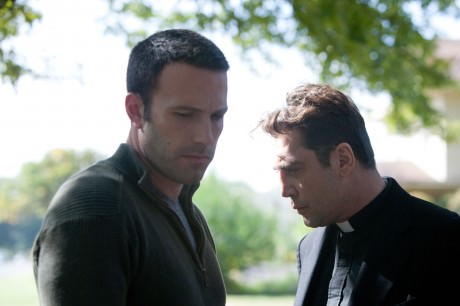Terrence Malick takes us To the Wonder, and beyond
Terrence Malick may be America’s most fuel-efficient filmmaker. Even when one of his movies is average-length it can seem like it will go on forever. … And I am a big fan.
All of Malick’s films are visual feasts, from Badlands and Days of Heaven to A Thin Red Line and The New World.

If one comes to them fresh-eyed, and meets them on their own Zen-like terms, Malick’s films are as close as cinema has come to a spiritual communion since the heyday of Ingmar Bergman.
Now, following the alternately banal and mind-blowing Tree of Life, Malick returns to U.S. art-houses April 14 with a new labor of love entitled To the Wonder.
Even at 113 minutes, To the Wonder feels a bit long since the dialogue is scant and its key emotions are more symphonic than glandular. It draws upon its characters’ inner thoughts as voice-overs at times to move things along. In other words, this is a film experience for seekers of truth, not for narrative escape artists
Never short on ambition, Terrence Malick is a master of cosmic contexts, and here he turns to relationships: the relationship of male and female, of man and nature, and of the mortal to the eternal.
Ben Affleck and Olga Kurylenko star as Neil and Marina, a not-so-youngish couple in the transformational spell of new love. Neil is a lunkheaded American scientist of few words — something Affleck excels at — and Marina is a beautiful Ukrainian divorcee living in Paris with her tres charment pre-teen daughter, Tatiana. We meet the couple on a mushy get-away trek to the Normandy tidal island of Mont Saint-Michel, known in France as the Merveille, or “the wonder.” Its famous stone castle promontory is one of the planet’s most glorious confluences of man and nature, for when the tide rises the ocean rushes in to completely separate the Gothic outpost from the jurisdiction of man.
Malick seizes on this as a visual metaphor for human romance: What begins in splendor and harmony must in time give way to isolation and dissolution. Olga Kurylenko, the radiant beauty from the Bond flick Quantum of Solace, is pure captivation as the smitten young mother. After accepting Affleck’s invitation for her and her daughter to come back to America with him, she becomes our window on that cultural divide.
At first it seems that Malick is heading toward a big Hollywood-style “tsk-tsk” at the American heartland, with its thirsty lawns and sterile tract homes, noisy downtown parades and symbolic celebrations. But Malick should never be lumped with mainstream filmmakers; his art is not about taking cheap shots.
A subplot about Affleck’s job as an environmental inspector is picked up and wisely dropped, for it distracts from the film’s focus. Likewise, a parallel story about a local immigrant priest (played by the always-riveting Javier Bardem) grappling with his gradual loss of connection to God is left in the background.
All these things are part of a tapestry that is more universal than political. The romantic blinders that shielded Neil and Marina fall away, and they are left to grapple with what remains.
Marina returns to France when her visa runs out and she finds Paris now an ugly and hostile place to live. She sends her daughter away to school and enters a downward spiral of melancholia even as Neil pursues an affair with an old school chum (Rachel McAdams). Marina and Neil must struggle to redefine their relationship.
Whatever problems To the Wonder may have as a movie, a lack of pictorial beauty is not one of them.
Working again with Director of Photography Emmanuel Lubezki, Malick invites us to observe the way the Mont Saint-Michel tide waters lap against Affleck’s boots; the different ways the sun sets and rises on the Oklahoma plains; the way trapped wasps provide the only sound in a sun-drenched seminary; and dozens of other cinematic stunners.
Since he is not tied by a strong narrative leash, Malick is free to pursue several avenues of investigation. Some of 2013’s most memorable movie moments may well be found here, particularly the scenes in which Javier Bardem interacts with real townspeople in jails and hospitals as they attempt to communicate their concerns over health and spiritual failings.
Then too, Olga Kurylenko’s radiant performance, ultimately as haunting as that of any of our great tortured heroines, deserves to be singled out for awards consideration.
I love Malick’s economical use of dialogue. A section detailing Miranda’s sexual fling with a local stranger unreels like a minimalist play with just his one spoken line of dialogue, “I thought you went away.”

To the Wonder, which premiered in competition at last fall’s Venice Film Festival, is one of those rare, re-humanizing documents that speaks to life as it is really lived. While not as compelling as some of his other projects, it contains beauties and shadows one only finds in the work of a master filmmaker like Terrence Malick.
Running Time: One hour and 55 minutes.
To the Wonder (rated R) opens April 12th at Landmark’s E Street Cinema 555 11th St. NW, in Washington DC, 20004 Times: 12:30 PM, 3:00 PM, 5:30 PM, 8:00 PM, and 10:30 PM. Buy Tickets.
LINK
To the Wonder website.




